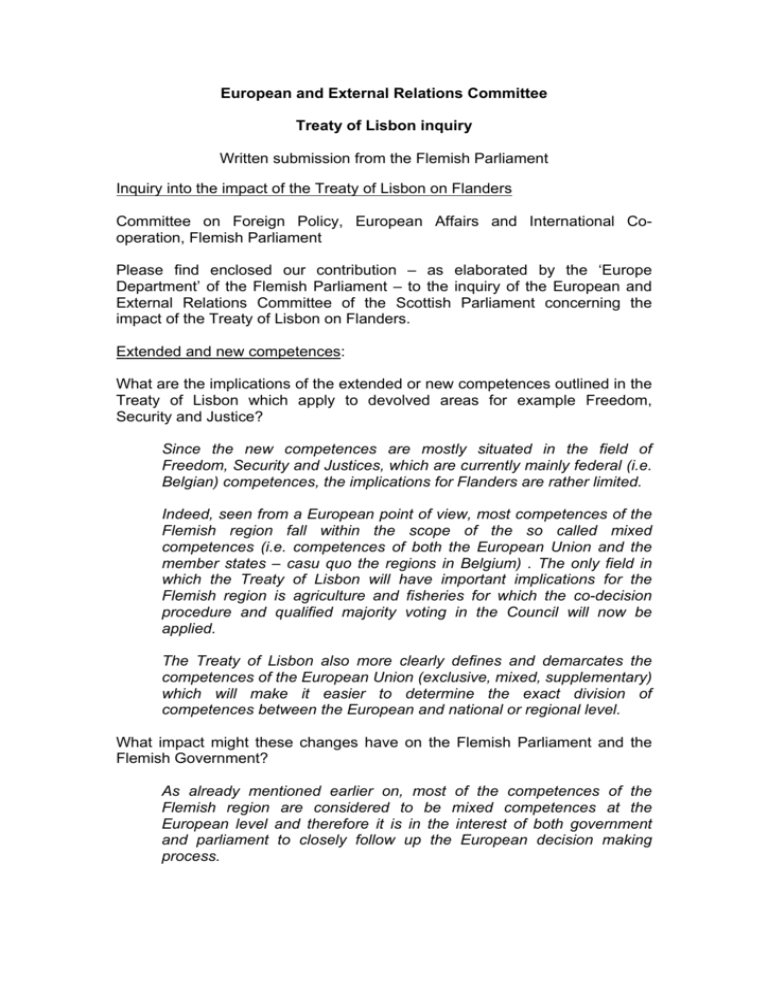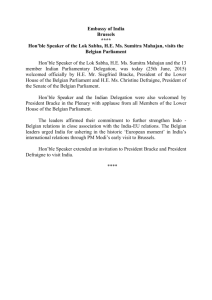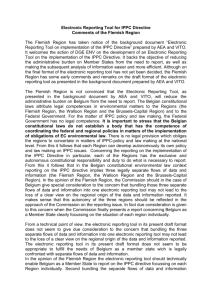Flemish Parliament
advertisement

European and External Relations Committee Treaty of Lisbon inquiry Written submission from the Flemish Parliament Inquiry into the impact of the Treaty of Lisbon on Flanders Committee on Foreign Policy, European Affairs and International Cooperation, Flemish Parliament Please find enclosed our contribution – as elaborated by the ‘Europe Department’ of the Flemish Parliament – to the inquiry of the European and External Relations Committee of the Scottish Parliament concerning the impact of the Treaty of Lisbon on Flanders. Extended and new competences: What are the implications of the extended or new competences outlined in the Treaty of Lisbon which apply to devolved areas for example Freedom, Security and Justice? Since the new competences are mostly situated in the field of Freedom, Security and Justices, which are currently mainly federal (i.e. Belgian) competences, the implications for Flanders are rather limited. Indeed, seen from a European point of view, most competences of the Flemish region fall within the scope of the so called mixed competences (i.e. competences of both the European Union and the member states – casu quo the regions in Belgium) . The only field in which the Treaty of Lisbon will have important implications for the Flemish region is agriculture and fisheries for which the co-decision procedure and qualified majority voting in the Council will now be applied. The Treaty of Lisbon also more clearly defines and demarcates the competences of the European Union (exclusive, mixed, supplementary) which will make it easier to determine the exact division of competences between the European and national or regional level. What impact might these changes have on the Flemish Parliament and the Flemish Government? As already mentioned earlier on, most of the competences of the Flemish region are considered to be mixed competences at the European level and therefore it is in the interest of both government and parliament to closely follow up the European decision making process. After all, although the impact of the changes will be limited, it is evidently in the interest of government and parliament to closely follow up the European decision making process and to enhance our efforts in this field (expediency, efficiency and promotion of ‘national’ interests are evident arguments for this close monitoring of the European decision making process) . Institutional and procedural changes: What are the implications of the key changes to the functions and powers of a) the European Parliament The number of Belgian MEP’s dropped from 24 (of which 14 Flemish MEP’s) to 22 (of which 13 Flemish MEP’s) b) the Court of Justice of the EU a. The Committee of the Regions has a privileged access to the Court of Justice to defend its prerogatives. It also can bring actions on grounds of infringement of the principle of subsidiarity by a European legislative act for the adoption of which the Lisbon treaty provides that it be consulted. Flanders currently has 5 effective members (and 6 substitute members – the discrepancy is due to a specific intra-Belgian agreement concerning the representation of the German speaking community of Belgium) in the Committee of the Regions. b. The new infringement procedure implies that the Court of Justice can impose a fine and damages-penalty together with the first condemnation of the member state (note that within Belgium a specific agreement exists through which regions that fall short of their international or European obligations can be held accountable) and the European Commission can introduce more rapidly a second procedure for noncompliance. This will call for a more rapid and stringent follow up of procedures by the Flemish government and administration. c. A member state (through its government) can ask the annulment of a legislative act of the European Union in case of infringement of the principle of subsidiarity. The Flemish government can therefore seize the Belgian government to introduce such a procedure of annulment. c) the European Commission Belgium (as all the other member states, for the time being) still has 1 commissioner d) the Council of Ministers In the field of agriculture and fisheries qualified majority voting will be applied instead of unanimity voting. Note thas as far as fisheries is concerned, Flanders is (due to the simple geographical fact that only the Flemish region has a coast line) exclusively mandated to speak and vote for Belgium. e) the European Council As of 1 January 2010 Herman Van Rompuy (former Belgian prime minister and former member op the Flemish Parliament) becomes the first permanent chairman of the European Council. What are the implications of the extension of co-decision into the devolved areas? For most of the Flemish competences co-decision is already being applied. Only in the field of agriculture and fisheries is there a change from unanimity to co-decision. What are the implications of these changes for the Flemish Parliament and the Flemish Government? Within the Belgian constitutional system in areas of devolved competences (environment, agriculture,..) Belgium will only cast a vote in the Council of Ministers if an agreement (i.e. mostly a compromise) is reached on the Belgian level (between the regions, or between the regions and the federal level). If no agreement is reached on the Belgian level the Belgian minister in the Council of Ministers will abstain from voting. If the Council of Ministers votes with unanimity an abstention is held not to stand in the way of unanimity, if the Council of Ministers votes with qualified majority an abstention is taken into account as a negative vote. In the field of agriculture and fisheries a Belgian abstention will lead to a negative vote (QMV) instead of a positive vote (unanimity). Subsidiarity: How and to what extent will the Protocol on the application of the principles of subsidiarity and proportionality impact on the role of the Flemish Parliament? In order to adapt the Belgian federal system to the Treaty of Lisbon and to allow Belgian regional parliaments to play a role in the subsidiarity procedure, it has been established that every Belgian parliament is a national parliament for the exercise of its competences. This was set out in Declaration 51 which was made by the Kingdom of Belgium in conjunction with the signing of the Treaty of Lisbon. Declaration 51 accords with the unique Belgian arrangement for international relations (‘in foro interno, in foro externo’). Declaration 51 by the Kingdom of Belgium on national parliaments states: ‘Belgium wishes to make clear that, in accordance with its constitutional law, not only the Chamber of Representatives and Senate of the Federal Parliament but also the parliamentary assemblies of the Communities and the Regions act, in term of the competences exercised by the Union, as components of the national parliamentary system or chambers of the national Parliament. (Note that this declaration is identical to Declaration 49 which was already attached to the former European Constitutional Treaty). In order to implement Declaration 51 the 7 Belgian parliaments need to establish a Cooperation Agreement amongst themselves. In this Cooperation Agreement all Belgian Parliament acknowledge that according to Declaration 51 and the Belgian Constitution each parliament (federal and regional) has to be recognized as a national parliament in the exercise of its competences. All of the legislative proposals and consultation documents of the European Commission will be simultaneous and collectively received, and every parliament can separately and autonomously examine whether the legislative proposal respects the principle of subsidiarity. The reasoned opinions of all 7 Belgian parliaments will be collated and sent to the European Commission on behalf of the Belgian Parliamentary System. The text of such a Cooperation Agreement was elaborated (and initialled) during the ratification process of the Lisbon Treaty in 2008 (note that a largely similar text had already been negotiated at the occasion of the ratification process of the European Constitutional Treaty in 2005). Is soon became apparent however, that within the current constitutional framework parliaments have no sufficient legal basis for establishing cooperation agreements amongst themselves. The rules set out for these cooperation agreements only pertain to the various governments (i.e. the entities they represent) that operate within Belgium (federal, regional, etc...). In order to provide for a sufficient legal basis it was deemed necessary to amend the Special Constitutional Law (i.e. not the Constitution itself but a basic law governing the devolution process). Changing this basic law however, implies a very heavy procedure and special majorities. Furthermore this is the sole prerogative of the Belgian federal parliament (i.e. both the Chamber of Representatives and the Senate). In mid 2008 a private members bill was introduced (by Mr. Herman Van Rompuy, the then Chairman of the Chamber of Representatives) to this effect. This bill never got past the committee stage, where it was last discussed (without any result) in December 2008. Without this necessary constitutional basis, and hence without formal adoption of the text of the cooperation agreement by all parliaments concerned, the status of this agreement is – legally speaking – highly unclear. It is not entirely impossible however that the agreement will – de facto – be adhered to. It goes without saying, that this is not a very satisfactory situation. Be it as it may, the Flemish Parliament intends to develop an internal procedure on how and when it will conduct such subsidiarity tests. How might the Flemish Parliament work with the Belgian Parliament and devolved assemblies in respect of the subsidiarity provisions of the Treaty of Lisbon? See answer to the question above. Are there examples of protocols and/or mechanisms developed by other regional parliaments with legislative powers from which the Scottish Parliament could learn? Please see enclosed brochure which explains the Belgian (constitutional) system for international relations (in foro interno, in foro externo). Text of Brochure explaining the Belgian constitutional system The European role of the Flemish Parliament Europe: more and more important for Flanders Europe plays an ever more important role in the daily life of the Flemish citizen. The introduction of the euro and the disappearance of the internal border checks are probably the best known examples of European integration, but a lot of ordinary Flemish legislation finds it origin in European legislation. The much-discussed Flemish legislation concerning the treatment of manure is the implementation of the European nitrate directive, the European habitat directive has been the source of Flemish legislation on the protection of bird sanctuaries and numerous Flemish quality standards (for example: the quality of bathing water) are established at European level. In respect of particular policy fields a great part of the Flemish legislation has its origin in European legislation. Every year the European Union enacts numerous directives and regulations that have a significant impact on Flemish policy fields such as the environment, agriculture and fisheries, research & development, infrastructure and economy. European directives must be transposed into Flemish legislation. If Flanders fails to transpose the European legislation into internal laws it can be penalised by the European Court of Justice and risks having to pay a high fine and damages. The transposition of a European directive is the conclusion of a long legislative process and leaves little scope for change. To influence successfully European legislation it is imperative to monitor legislation process from its conception and attempt to influence it during each of the different stages of the process. How does the division of the international competences within the Belgian federalism work? The Belgian federal system is characterised by a very strict division of competences between the federal level and the regional level. A policy field (for example: environmental policy) always falls within the exclusive competence of a specific political level (for example: region). This principle of exclusivity rules out a hierarchy of laws, which implies that a federal law and a regional law (a decree) are of the same value. The principle ‘in foro interno, in foro externo’ is unique to the Belgian federal system. It states that the political level that has competence for that area within Belgium also exercises this competence at international level. Within Belgium the regions have competence for environmental policy, so only the regions have the competence to conclude international treaties concerning environmental policy. This arrangement is unique in the world. In other federal countries such as the German Federal Republic and the United States of America only the federal level has the competence to negotiate, conclude and ratify international treaties. If the Flemish government concludes an international treaty, it has to be debated and voted in the Flemish Parliament. The principle ‘in foro interno, in foro externo’ also applies in the European decision making process. The Belgian federal system and the Council of Ministers (Europe) The European Union is a cooperation between national states and not between regions. In the European decision making process the Council of Ministers plays a central role. In the Council of Ministers, the national ministers competent for a certain policy field (for example: environmental policy) meet to discuss the legislation proposed by the European Commission. The Council of Ministers decides by qualified majority or unanimity. In Belgium certain policy fields fall within the exclusive competence of the regions. The Treaty of Maastricht (1992) authorized regional ministers to represent their member state in the Council of Ministers (article 203 TEC). This makes it possible for the Flemish minister of environmental affairs to participate in the meetings of the Council of Ministers. The minister takes a position and votes during the meeting, but he will act for the Belgian Federal State and not for the Flemish Region. The Cooperation Agreement of the 8th of March 1994 between the federal state, the communities and the regions concerning the representation of Belgium in the Council of Ministers determines which regional minister will represent Belgium in meetings of the Council of Ministers. The Cooperation Agreement of the 8th of March 1994 determines how and under which conditions the Belgian position in the Council of Ministers is elaborated and establishes a rotation system between the federal and regional ministers and between the ministers of the different regions concerning the representation of Belgium in the Council of Ministers. The Belgian position in the Council of Ministers is the result of a lengthy and intense consultation process during the different stages between the representatives or ministers of the competent levels (federal and regional). During this consultation process a concensus is pursued that takes account of the interests of the different political levels. If no consensus can be reached, the representative of Belgium in the Council of Ministers will abstain when the European legislation is voted on. The Flemish team within the Belgian Permanent Representation to the EU The Permanent Representations of the member states in Brussels play a crucial role in the European decision making process. COREPER (Committee of Permanent Representatives (ambassadors)) and many other committees and working groups of representatives of the member states meet every week. They prepare the papers for the meetings of the Council of Ministers and seek compromises and agreement between the 27 member states. A Flemish team, headed by the General Representative of the Flemish Government to the European Union, is part of the Belgian Permanente Representation and plays a central role in the Flemish participation in the European decision making process. The 15 members of the Flemish delegation monitor all regional policy fields and take part in the meetings of the committees and working groups dealing with these competences. Europe can not always act: the subsidiarity check, an additional instrument of control for national parliaments Two protocols attached to the Treaty of Lisbon (concluded on December 2007, but not into force yet), enable national parliaments to play a role in the European decision making process. The 2 protocols (Protocol on the role of national parliaments in the European Union and the protocol concerning the application of the principles of subsidiarity and proportionality) set out the rules by which national parliaments can determine whether legislative proposals of the European Commission respect the principle of subsidiarity. The principle of subsidiarity states that the European Union can only act if better results can be obtained by of reason of scale and if the same results can not be obtained by an individual act of the member states. The European Commission sends its legislative proposals to the national parliaments of the member states. During an 8 week period national parliaments can examine whether the legislative proposals respect the principle of subsidiarity. If a national parliament judges that an infringement has occurred it sends a reasoned opinion with its objections to the European Commission. If one third of the parliaments of the member states issues a negative opinion the European Commission has to reconsider the legislative proposal. If half of the national parliaments issues a negative opinion the European Commission has to justify why it maintains the legislative proposal and the European legislator (European Parliament and Council) has to consider if the legislative proposal is compatible with the principle of subsidiarity. On September 6th 2006 the European Commission decided to proceed with the subsidiarity procedure and to start sending legislative proposals to the national parliaments. The Flemish Parliament is a national parliament In order to adapt the Belgian federal system to the Treaty of Lisbon and to allow Belgian regional parliaments to play a role in the subsidiarity procedure, it has been established that every Belgian parliament is a national parliament for the exercise of its competences. This has been set down in Declaration 51 which was made by the Kingdom of Belgium in conjunction with the signing of the Treaty of Lisbon. Declaration 51 accords with the unique Belgian arrangement for international relations (‘in foro interno, in foro externo’). Declaration 51 by the Kingdom of Belgium on national parliaments states: ‘Belgium wishes to make clear that, in accordance with its constitutional law, not only the Chamber of Representatives and Senate of the Federal Parliament but also the parliamentary assemblies of the Communities and the Region act, in term of the competences exercised by the Union, as components of the national parliamentary system or chambers of the national Parliament.’ In order to implement Declaration 51 the 7 Belgian Parliaments are negotiating a Cooperation Agreement. In this Cooperation Agreement all Belgian Parliaments acknowledge that according to Declaration 51 and the Belgian Constitution each parliament (federal and regional) has to be recognized as a national parliament in the exercise of its competences. All of the legislative proposals and consultation documents of the European Commission will be simultaneously and collectively received by all Belgian Parliaments, and every parliament can separately and autonomously examine whether the legislative proposal respects the principle of subsidiarity. The reasoned opinions of all 7 Belgian Parliaments will be collated and sent to the European Commission on behalf of the Belgian Parliamentary System. On June 1st 2005 the Flemish Parliament established a European Office to ensure that European issues and the European decision making process are discussed and monitored on a regular basis. The main tasks of the European Office are: • To collect information about European legislation and European legislative proposals and make them available to the standing committees and the members of parliament; • Pursue European issues that are important for Flanders; • Organise training on the European Union and the European decision making process for the members and the staff of the Flemish Parliament; • Establish European networks and enhance the influence of the Flemish Parliament on the European decision making process. The instruments of the Flemish Parliament to influence Europe? The Flemish Parliament and its members can influence the European decision making process by monitoring the Flemish government and its ministers. Flemish ministers have to explain and defend their policy in the standing committees of the parliament. The horizontal European policy of the Flemish Government is debated in the standing committee for Foreign Policy, European affairs, International Cooperation and Tourism. All other European policy is debated in the competent standing committee. The standing committee on environment will scrutinise the European environmental policy and the position of the Flemish Government in this field. In every standing committee a member of parliament is assigned as ‘europromotor’ and it is his or her task, together with the European Office, to stimulate debate and discussion about European policy in the standing committee. Members of the Flemish Parliament can influence the European decision making process by: • Oral or written questions in the standing committees or plenary; • Interpellations, motions and resolutions; • Hearings and committee meetings with the competent minister, officials of the European Commission or other players in the European decision making process. The members of parliament have some specific instruments at their disposal to scrutinise the European decision making process: • ‘De Vlaamse vinger aan de Europese pols’ a 6 monthly publication of the Flemish Government with the most recent developments in European policy in fields that are important for Flanders; • Monthly reports on EU-policy by the Flemish minister for Foreign Affairs; • Studying the draft European legislation and consultation documents from the European Commission that are sent to the national parliaments; • Participating at Joint Parliamentary Meetings and Joint Committee Meetings organised by the European Parliament. At these meetings members of the European Parliament and of the national parliament discuss European policy.








